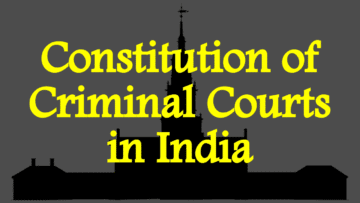Chapter 3 (Sections 21 to 29) of the Bharatiya Nagarik Suraksha Sanhita (BNSS), 2023 deals with the powers of criminal courts in India, discussing what crimes can be tried by courts, what punishments can be awarded by the High Court and Sessions Judge, what punishments can be awarded by magistrates, sentence of imprisonment in case of non-payment of fine, punishment in cases of conviction for multiple offences in a single trial, manner of conferring powers, powers of appointed officers, withdrawal of powers, powers of judges and magistrates to be exercised by their successors, etc.
Chapter 3 (Sections 21 to 29) of the Bharatiya Nagarik Suraksha Sanhita (BNSS), 2023
- Section 21 – Courts by which offences are triable.
- Section 22 – Sentences which High Courts and Sessions Judges may pass.
- Section 23 – Sentences which Magistrates may pass.
- Section 24 – Sentence of imprisonment in default of fine.
- Section 25 – Sentence in cases of conviction of several offences at one trial.
- Section 26 – Mode of conferring powers.
- Section 27 – Powers of officers appointed.
- Section 28 – Withdrawal of powers.
- Section 29 – Powers of Judges and Magistrates exercisable by their successors-in-office.

Table of Contents
Power of criminal courts in India
The following are the powers of criminal courts in India under Chapter 3, Sections 21 to 29 of the Bharatiya Nagarik Suraksha Sanhita (BNSS), 2023:
Courts by which offences are triable
Section 21 of the Bharatiya Nagarik Suraksha Sanhita (BNSS), 2023 describes the courts by which offences are triable, and under this,
(a) Any offence under the Bharatiya Nyaya Sanhita, 2023 may be tried by:
- The High Court, or
- The Court of Session; or
- Any other Court by which such offence is shown in the First Schedule to be triable.
Provided that any offence under:
- Section 64 – Punishment for rape,
- Section 65 – Punishment for rape in certain cases,
- Section 66 – Punishment for causing death or resulting in persistent vegetative state of victim,
- Section 67 – Sexual intercourse by husband upon his wife during separation,
- Section 68 – Sexual intercourse by a person in authority,
- Section 69 – Sexual intercourse by employing deceitful means, etc.,
- Section 70 – Gang rape, or
- Section 71 – Punishment for repeat offenders,
of the Bharatiya Nyaya Sanhita, 2023 shall be tried as far as practicable by a Court presided over by a woman.
Note: Any offence under any other law shall, when any Court is mentioned in this behalf in such law, be tried by such Court.
(b) When no Court is mentioned, may be tried by:
- The High Court, or
- Any other Court by which such offence is shown in the First Schedule to be triable.
Sentences that the court may pass
Sections 22 and 23 of the Bharatiya Nagarik Suraksha Sanhita (BNSS), 2023 describe the sentences that the court may pass, and under this,
| Courts | Sentences |
| High Court | Any sentence authorised by law. |
| Session Court | Any sentence authorised by law, but any sentence of death passed by any such court, shall be subject to confirmation by the High Court. |
| Chief Judicial Magistrate | Any sentence authorised by law except a sentence of death or of imprisonment for life or of imprisonment for a term exceeding seven years. |
| Judicial Magistrate First Class | – A sentence of imprisonment for a term not exceeding three years, or – of fine not exceeding fifty thousand rupees, or – of both, or – of community service. |
| Judicial Magistrate Second Class | – A sentence of imprisonment for a term not exceeding one year, or – of fine not exceeding ten thousand rupees, or – of both, or – of community service. |
High Court (HC)
Section 22(1) of the Bharatiya Nagarik Suraksha Sanhita (BNSS), 2023 describes the sentences (punishments) that may passed by the High Court (HC), and under this,
- The High Court can pass any sentence authorised by law.
Session Court (SC)
Section 22(2) of the Bharatiya Nagarik Suraksha Sanhita (BNSS), 2023 describes the Sentences (punishments) that may passed by the Sessions Judges (SC), and under this,
- A Sessions Judge or Additional Sessions Judge may pass any sentence authorised by law; but any sentence of death passed by any such Judge shall be subject to confirmation by the High Court.
Chief Judicial Magistrate (CJM)
Section 23(1) of the Bharatiya Nagarik Suraksha Sanhita (BNSS), 2023 describes the Sentences (punishments) that may passed by the Chief Judicial Magistrate (CJM), and under this,
- The Court of a Chief Judicial Magistrate may pass any sentence authorised by law except a sentence of death or of imprisonment for life or of imprisonment for a term exceeding seven years.
Judicial Magistrate First Class (JMIC)
Section 23(2) of the Bharatiya Nagarik Suraksha Sanhita (BNSS), 2023 describes the Sentences (punishments) that may passed by Magistrate of the first class (JMIC), and under this,
- The Court of a Magistrate of the first class may pass a sentence of imprisonment for a term not exceeding three years, or of fine not exceeding fifty thousand rupees, or of both, or of community service.
Judicial Magistrate Second Class (JMIIC)
Section 23(3) of the Bharatiya Nagarik Suraksha Sanhita (BNSS), 2023 describes the Sentences (punishments) that may passed by Magistrate of the second class (JMIIC), and under this,
- The Court of Magistrate of the second class may pass a sentence of imprisonment for a term not exceeding one year, or of fine not exceeding ten thousand rupees, or of both, or of community service.
Note: The community service sentence is explained under Section 23 of the the Bharatiya Nagarik Suraksha Sanhita (BNSS), 2023 – “Community service” shall mean the work which the Court may order a convict to perform as a form of punishment that benefits the community, for which he shall not be entitled to any remuneration.
Sentence of imprisonment in default of fine
When a person defaults in paying the fine, the Magistrate may impose a sentence of imprisonment for non-payment of fine as per the provisions given under Section 24 of the Bharatiya Nagarik Suraksha Sanhita (BNSS), 2023.
Sentence of imprisonment in default of fine as follows:
- The Court of a Magistrate may award such term of imprisonment in default of payment of fine as is authorised by law:
- Provided that the term—
- (a) is not in excess of the powers of the Magistrate under section 23;
- (b) shall not, where imprisonment has been awarded as part of the substantive sentence, exceed one-fourth of the term of imprisonment which the Magistrate is competent to inflict as punishment for the offence otherwise than as imprisonment in default of payment of the fine.
- Provided that the term—
- The imprisonment awarded under this section may be in addition to a substantive sentence of imprisonment for the maximum term awardable by the Magistrate under section 23.
Sentence in cases of conviction of several offences at one trial
Section 25 of the Bharatiya Nagarik Suraksha Sanhita (BNSS), 2023 describes the Sentence in cases of conviction of several offences at one trial, and under this,
- When a person is convicted at one trial of two or more offences, the Court may, subject to the provisions of section 9 of the Bharatiya Nyaya Sanhita, 2023, sentence him for such offences, to the several punishments prescribed therefor which such Court is competent to inflict and the Court shall, considering the gravity of offences, order such punishments to run concurrently or consecutively.
- In the case of consecutive sentences, it shall not be necessary for the Court by reason only of the aggregate punishment for the several offences being in excess of the punishment which it is competent to inflict on conviction of a single offence, to send the offender for trial before a higher Court:
- Provided that—
- (a) in no case shall such person be sentenced to imprisonment for a longer period than twenty years;
- (b) the aggregate punishment shall not exceed twice the amount of punishment which the Court is competent to inflict for a single offence.
- Provided that—
- For the purpose of appeal by a convicted person, the aggregate of the consecutive sentences passed against him under this section shall be deemed to be a single sentence.
Mode of conferring powers
Section 26 of the Bharatiya Nagarik Suraksha Sanhita (BNSS), 2023 describes the mode of conferring powers, and under this,
- In conferring powers under this Sanhita, the High Court or the State Government, as the case may be, may, by order, empower persons specially by name or in virtue of their offices or classes of officials generally be their official titles.
- Every such order shall take effect from the date on which it is communicated to the person so empowered.
Powers of officers appointed
Section 27 of the Bharatiya Nagarik Suraksha Sanhita (BNSS), 2023 describes the powers of officers appointed, and under this,
- Whenever any person holding an office in the service of Government who has been invested by the High Court or the State Government with any powers under this Sanhita throughout any local area is appointed to an equal or higher office of the same nature, within a like local area under the same State Government, he shall, unless the High Court or the State Government, as the case may be, otherwise directs, or has otherwise directed, exercise the same powers in the local area in which he is so appointed.
Withdrawal of powers
Section 28 of the Bharatiya Nagarik Suraksha Sanhita (BNSS), 2023 describes the withdrawal of powers, and under this,
- The High Court or the State Government, as the case may be, may withdraw all or any of the powers conferred by it under this Sanhita on any person or by any officer subordinate to it.
- Any powers conferred by the Chief Judicial Magistrate or by the District Magistrate may be withdrawn by the respective Magistrate by whom such powers were conferred.
Powers of Judges and Magistrates exercisable by their successors-in-office
Section 29 of the Bharatiya Nagarik Suraksha Sanhita (BNSS), 2023 describes the powers of Judges and Magistrates exercisable by their successors-in-office, and under this,
- Subject to the other provisions of this Sanhita, the powers and duties of a Judge or Magistrate may be exercised or performed by his successor-in-office.
- When there is any doubt as to who is the successor-in-office, the Sessions Judge shall determine by order in writing the Judge who shall, for the purposes of this Sanhita or of any proceedings or order thereunder, be deemed to be the successor-in-office.
- When there is any doubt as to who is the successor-in-office of any Magistrate, the Chief Judicial Magistrate, or the District Magistrate, as the case may be, shall determine by order in writing the Magistrate who shall, for the purpose of this Sanhita or of any proceedings or order thereunder, be deemed to be the successor-in-office of such Magistrate.
Read Also:
QNA/FAQ
Q1. The Chief Judicial Magistrate cannot award a sentence of imprisonment for a term exceeding how many years?
Ans: The Chief Judicial Magistrate cannot pass a sentence of imprisonment for a term exceeding seven years.
Q2. The High Court can pass any sentence authorised by law, which is described in which section?
Ans: The High Court can pass any sentence authorised by law, which is described in Section 22(1) of the Bharatiya Nagarik Suraksha Sanhita (BNSS), 2023.
Q3. Which court is not competent to give a sentence of more than 3 years?
Ans: The Court of Judicial Magistrate First Class is not competent to award punishment for more than 3 years.
Q4. Does the Sessions Court have the power to award death sentence?
Ans: Yes, the Sessions Court has the power to award death sentence but for this the permission of the High Court is required.
Q5. What is the amount of fine that a First Class Judicial Magistrate has the power to impose as punishment?
Ans: The first-class judicial magistrate has the power to impose a fine up to fifty thousand rupees.
Source:













